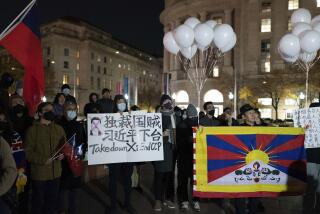Zhao and Up to 6 Other Moderates Reported Targets of Purge in China
- Share via
BEIJING — A conservative Chinese leader Friday indirectly denounced Communist Party chief Zhao Ziyang’s reformist faction for plotting “schemes and intrigues” against the party, amid reports that Zhao and as many as six other moderates were targeted for a purge.
The public attack was another indication that the conservatives had gained an upper hand in the leadership power struggle that was provoked by the student-led pro-democracy movement.
“The dogs are biting the dogs, fighting for a bone,” said one Beijing resident, describing the fiercest power struggle in a decade.
Chinese sources said hard-line leaders had summoned senior Communist Party members to Beijing for a special meeting, and state radio broadcast an order to rank-and-file party members to “carry on their duties” and “immediately quit demonstrations.”
Word of what could be the biggest leadership purge in a decade came as students leading the democracy movement voted overwhelmingly to continue occupying Beijing’s central Tian An Men Square, despite increasing chances of a crackdown.
But there were no protests Friday at the square, and the number of occupying students camped in a shantytown of plastic tents dwindled to between 20,000 to 25,000.
Veteran party conservative Chen Yun, in a nationally televised address, warned of a secret plot aimed at toppling paramount leader Deng Xiaoping and his allies, including Premier Li Peng.
Chen did not mention Communist Party chief Zhao Ziyang by name, but his attack clearly was aimed at Zhao’s liberal reformist faction of the party.
“We old comrades must resolutely expose and struggle against a very, very small number of people who have fabricated schemes and intrigues, and never yield to them,” Chen said.
“This turmoil is truly not coincidental. One of the important reasons is that for a certain period of time we have eased off education in Marxist thought,” he said in language reminiscent of chaotic factional strife and leadership struggles of the 1966-1976 Cultural Revolution.
Chinese and Western sources said that Zhao, Defense Minister Qin Jiwei and as many as five others were marked for a purge for opposing conservative Li’s decision to declare martial law a week ago and deploy troops in Beijing.
Zhao and Qin were believed to have been under a form of house detention all week but had yet to be formally arrested, Chinese sources said.
The sources said the six were considered part of an “anti-party clique” that failed to stem student protests that sparked the largest anti-government demonstrations since the founding of the communist state in 1949.
Chinese sources said that in order to lend the coming purge an air of legitimacy, the shake-up would not be announced until after the conservatives succeeded in holding a special plenum of the party’s Central Committee.
As the country awaited results of the power struggle, state radio broadcast an order to rank-and-file party members.
“All party members have to remain in their posts, carry on their duties carefully and observe martial law” and “immediately quit demonstrations, the petitions, the strikes and the boycotting of classes.”
Of China’s 1 billion people, only 47 million are party members. Although some party members joined in the pro-democracy protests, most demonstrators were non-party students and workers.
Premier Li appeared to be consolidating his authority, after resurfacing Thursday for the first time since the power struggle erupted and declaring the Deng government “capable and stable.”
The Communist Party newspaper People’s Daily carried a statement Friday by the political department of the Beijing region’s military command throwing its support behind the martial law decree issued a week ago Saturday by Li. The six other military commands surrounding the capital had issued similar statements earlier in the week.
Western diplomats said the army has moved more troops into the city’s outskirts in recent days. At least 80,000 soldiers were believed encircling the capital after failing in initial attempts last weekend to break through citizens’ barricades, the diplomats said.
Li, whose resignation has been called for by the protesting students, said Thursday that the army had stopped not because it was unable to move but because it had been “tolerant” of the peaceful demonstrations.
The Western and Chinese sources said Zhao had been named as leading an “anti-party clique.” They noted that military statements backing the martial law decree criticized a conspiracy by a “small group of people.”
“At first we thought they meant the student leaders and those supporting them,” a Western intelligence source said. “But it looks like they mean the people with Zhao and against martial law.”
Besides Zhao and Qin, others believed targeted included Zhao’s former secretary, Bao Tong, head of a Zhao-sponsored reformist think tank, and Hong Xuezhi, a senior member of the National People’s Congress, the Parliament.
Also included were Yan Mingfu and Wen Jiabao, both senior Central Committee members, and Du Runsheng, director of the party’s rural policy research center, the sources said.
Zhao and Yan had tried to conciliate with the students, while the others were criticized for supporting or being too tolerant of the protests or of permitting news coverage of the demonstrations, sources said.
Leaders of the student movement, meanwhile, held a crucial all-night meeting in Tian An Men Square, with 278 students voting to continue the sit-in that began in earnest May 13, said Ji Cheng, a student at Beijing University.
More to Read
Sign up for Essential California
The most important California stories and recommendations in your inbox every morning.
You may occasionally receive promotional content from the Los Angeles Times.













